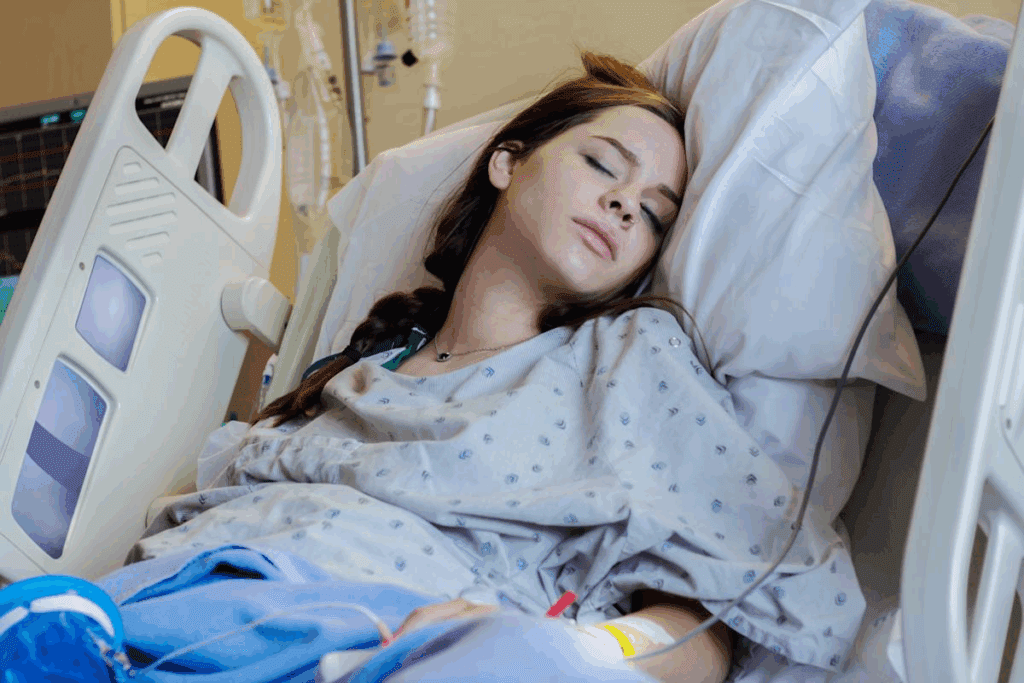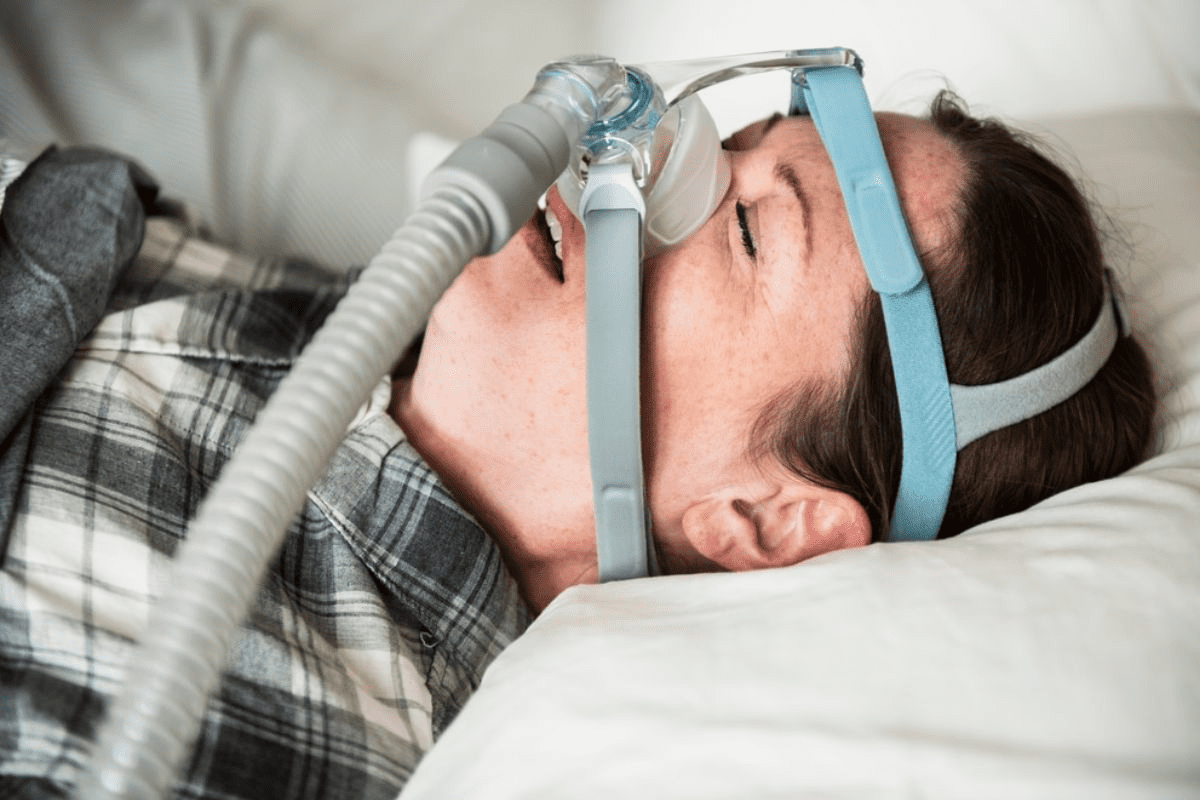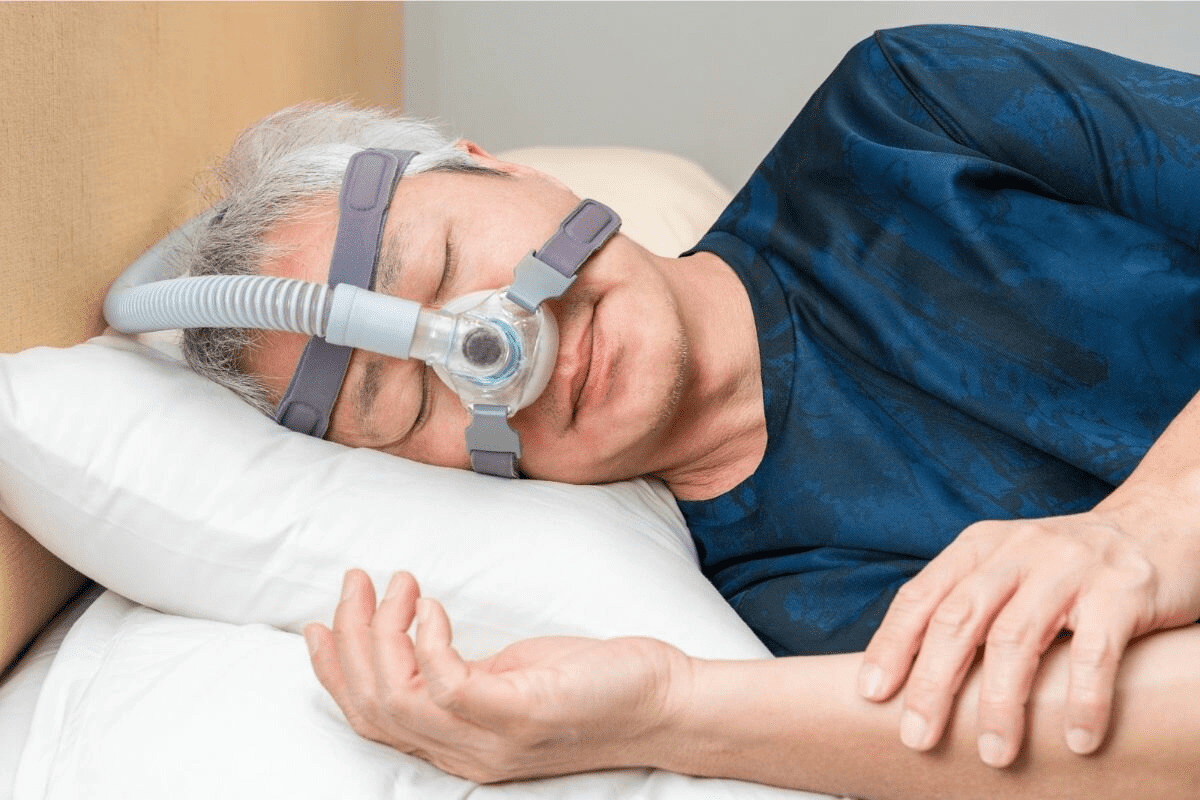Last Updated on November 27, 2025 by Ugurkan Demir

Sleep apnea affects millions of Americans, with about 12 million having obstructive sleep apnea. While CPAP is a common treatment, many patients struggle to use it for long. We know how hard it is to live with sleep apnea and need good treatment options.
If you can’t use CPAP, there’s hope. New York City now has advanced surgical and non-surgical options. These offer expert care for sleep disorders, focusing on each patient’s needs.
Knowing your treatment choices helps you make better health decisions. We’ll look at the sleep apnea treatment options in NYC. This will help you find the best treatment for your life and health.
How to choose between cpap alternative surgery options, including Inspire, UPPP, and Maxillomandibular Advancement (MMA).

Sleep apnea is becoming more common, affecting a big part of the adult population in the U.S. It’s not just about not sleeping well. It’s a serious issue that can harm your health if not treated.
Between 10% and 30% of adults in the U.S. have sleep apnea. This wide range shows how tricky it is to diagnose and how common it is. It affects different groups in different ways.
Many people don’t know they have sleep apnea because its symptoms are not always clear. But, more people are starting to understand its importance as a health issue.
There are three main types of sleep apnea: obstructive, central, and complex. Obstructive sleep apnea (OSA) is the most common. It happens when the airway gets blocked by relaxed muscles. Central sleep apnea (CSA) is when the brain doesn’t tell the breathing muscles to work. Complex sleep apnea is a mix of OSA and CSA.
Each type can cause different health problems. Untreated sleep apnea can lead to heart disease and increase the risk of accidents. It can also make daily life much harder.
Getting the right diagnosis and treatment for sleep apnea is key. Doctors usually use a sleep study to diagnose it. This can be done at home or in a lab. Treatment depends on the type and how severe it is. It can range from changing your lifestyle to using CPAP machines or even surgery.
In New York, there are many ways to treat sleep apnea. This includes CPAP therapy, oral appliances, and surgery. Knowing about these options helps patients make better choices for their care.

CPAP treatment has changed lives for many, but about half face long-term challenges. We know CPAP therapy is a common and effective way to treat sleep apnea. Yet, it comes with its own set of challenges.
CPAP machines deliver pressurized air through a mask that covers the nose and sometimes the mouth. This keeps the airway open during sleep. The effectiveness of CPAP in reducing sleep apnea episodes and improving sleep quality is well-documented.
Many patients struggle to tolerate CPAP therapy long-term. Common issues include discomfort from the mask, noise from the machine, and claustrophobia. These challenges can significantly impact a patient’s ability to adhere to the prescribed treatment.
A study found that nearly half of the patients prescribed CPAP therapy struggle with compliance due to these issues. We must consider these challenges when evaluating treatment options for sleep apnea.
For patients who cannot tolerate CPAP therapy, alternative treatments are available. These include oral appliances, positional therapy, and in some cases, surgery. It’s essential to consult with a healthcare professional to determine the most suitable treatment based on the severity of sleep apnea and individual patient needs.
Treatment Option | Description | Benefits |
Oral Appliances | Custom-made devices that advance the lower jaw | Comfortable, easy to use, effective for mild to moderate sleep apnea |
Positional Therapy | Devices that prevent sleeping on the back | Simple, non-invasive, effective for positional sleep apnea |
Surgical CPAP Alternatives | Surgical procedures to remove obstructions | Permanent solution for some patients, reduces or eliminates need for CPAP |
When considering cpap or surgery, it’s vital to weigh the benefits and risks of each option. For some, surgical cpap alternatives may offer a more permanent solution. Others may find continued use of CPAP or other non-surgical alternatives more suitable.
There are many non-surgical treatments for sleep apnea. For those in Midtown NYC looking for sleep apnea natural treatment, these options are worth trying.
Oral appliances, like mandibular advancement devices (MADs), move the lower jaw forward. This keeps the airway open while you sleep. They work well for mild to moderate sleep apnea and are more comfortable than CPAP machines.
It’s important to talk to a sleep specialist to see if an oral appliance is right for you. They will check your condition and fit the device for you. A dental professional skilled in sleep apnea treatment will do this.
Positional therapy is a CPAP alternative that helps you sleep in a way that keeps your airway open. It uses a device that vibrates if you roll onto your back, encouraging you to sleep on your side.
Research shows that positional therapy can greatly reduce sleep apnea episodes in back sleepers. It’s easy, doesn’t hurt, and works well with other lifestyle changes.
Making lifestyle changes is key to managing sleep apnea. Weight loss can help a lot, for example. Also, regular exercise, avoiding alcohol and sedatives at night, and sleeping on your side are natural ways to help.
If you’re considering sleep apnea treatment surgery or other options, start with these lifestyle changes. They can make your sleep apnea symptoms better and improve your overall health.
If CPAP therapy doesn’t work, looking into surgery is a big step for those with sleep apnea. Surgery is considered when other treatments don’t work or are hard to handle.
Surgery for sleep apnea is for those who have tried CPAP and other treatments but are not better. Surgical options aim to fix the physical blockage causing sleep apnea. This can lead to better sleep and health.
To see if surgery is right for you, a detailed check is needed. This includes:
A team of healthcare experts will decide if surgery is a good option for you. They will suggest the best surgery.
Like any surgery, sleep apnea surgery has risks and benefits. It’s important to know these to make a good choice.
Potential Benefits | Potential Risks |
Improved sleep quality | Surgical complications (infection, bleeding) |
Reduced sleep apnea symptoms | Temporary discomfort or pain |
Enhanced overall health and well-being | Risks associated with anesthesia |
By thinking about these points and talking to your doctor, you can decide if surgery is right for you.
Hypoglossal nerve stimulation is a new and effective way to treat sleep apnea surgery options. It uses an implanted device called Inspire. This device helps manage sleep apnea symptoms.
The Inspire device stimulates the hypoglossal nerve. This nerve controls the tongue’s movement. When you sleep, the device helps keep your airway open.
This upper airway stimulation technology stops the airway from collapsing. It reduces sleep apnea episodes.
The procedure to implant the Inspire device is simple. It’s done under general anesthesia. A few small incisions are made to place the device.
The device includes a pulse generator, a breathing detection lead, and a stimulation lead. Recovery is quick, with most people back to normal in a few days. It’s important to follow the post-operative instructions to heal properly and for the device to work well.
Clinical trials and studies show Inspire therapy is effective for those who can’t use CPAP therapy. Success rates are high, with many patients seeing a big drop in sleep apnea episodes.
Long-term results are also good. The device works well over time. Regular check-ups with healthcare providers are key to keep the device working right.
MMA surgery is a top choice for treating sleep apnea. It moves the upper and lower jaw forward. This makes the airway bigger, helping to stop sleep apnea symptoms.
MMA surgery cuts the jaw bones and moves them forward. This makes the airway wider. It’s done by an oral surgeon and a sleep specialist.
The surgery’s benefits are:
Recovering from MMA surgery takes time. First, you’ll feel swollen and sore. Use pain meds and cold packs to help. You’ll eat liquids at first, then soft foods.
After surgery, you need:
Research shows MMA surgery works well for sleep apnea. It lowers AHI scores a lot. How well it works long-term depends on how bad your sleep apnea is and following your doctor’s advice.
Study | Success Rate | Follow-up Period |
Study A | 85% | 2 years |
Study B | 90% | 5 years |
Study C | 78% | 1 year |
In summary, MMA surgery is a good option for severe sleep apnea. Knowing about the surgery, its benefits, and recovery helps patients make the right choice for their sleep apnea treatment.
For those looking beyond CPAP therapy, there are surgical options for sleep apnea. CPAP is common, but some find it hard to use or doesn’t work for them. Surgery can offer relief for these patients.
Genioglossus muscle advancement is a surgery for tongue base obstruction, a sleep apnea cause. It moves the genioglossus muscle to stop the tongue from blocking the airway at night. It’s for those with tongue issues who haven’t seen results from other treatments.
Benefits of Genioglossus Muscle Advancement:
UPPP surgery removes throat tissue, like the uvula and soft palate. It aims to widen the airway and fix soft palate problems. It’s often done with other surgeries for better results.
Key considerations for UPPP include:
Tongue reduction and radiofrequency are other treatments for sleep apnea. Tongue reduction makes the tongue smaller to avoid airway blockage. Radiofrequency uses heat to shrink tongue or other tissues, also reducing blockage.
Advantages of these procedures include:
Thinking about cpap surgery or other treatments? A sleep apnea consultation is key. In New York, sleep apnea treatment midtown nyc offers many options, from surgery to other therapies.
NYC is a top spot for sleep apnea diagnosis and treatment. It has the best specialists and centers. Finding the right care is key for managing sleep apnea. We’ll show you the top sleep centers, leading surgeons, and team approaches in New York City.
Manhattan and Midtown have some of the best sleep centers in the U.S. These places offer detailed sleep studies and talks with top experts.
New York City has many skilled sleep apnea surgeons. They specialize in different surgical methods.
NYC hospitals treat sleep apnea with a team effort. This team includes many specialists.
This team approach means you get full care. From diagnosis to treatment and follow-ups, you’re covered.
Finding the right sleep apnea treatment in New York can be tough. You need to know about your options, insurance, and what to expect. The city has many sleep centers and specialists, but it’s easy to get lost without guidance.
Knowing your insurance is key to managing treatment costs. Most plans cover sleep apnea treatment, but the details vary.
Key factors to consider:
Being ready for your consultation is important. Here are some key questions to ask:
Asking these questions helps you make a smart choice about your care.
Listening to others who’ve had treatment can be very helpful. NYC sleep centers often share stories of patients who’ve seen big improvements.
“The care I received at the sleep center was exceptional. The team was knowledgeable, and the treatment has significantly improved my sleep quality.” –
A satisfied patient
These stories can give you hope and motivation as you go through your treatment.
We’ve looked at many ways to treat sleep apnea, including CPAP alternatives and surgery. Knowing these options helps you choose the best care for you. Surgery and other treatments are good choices if CPAP doesn’t work.
CPAP alternatives like oral appliances and positional therapy are easy to use. For serious cases, surgeries like hypoglossal nerve stimulation and maxillomandibular advancement might be needed. Always talk to a sleep specialist to find the right treatment for you.
By looking at the good and bad of each option, you can pick the best treatment. We want you to sleep well and live better. With the right treatment, you can beat sleep apnea and feel full of energy again.
Sleep apnea has three main types. Obstructive sleep apnea (OSA) is the most common. It happens when the airway gets blocked.
CPAP therapy uses a mask to send air into your airway. This keeps it open, stopping pauses in breathing.
Other options include oral appliances and positional therapy. You can also try lifestyle changes or surgery like hypoglossal nerve stimulation.
Surgery is an option when CPAP and oral appliances don’t work. It’s for severe cases or when health is at risk.
Hypoglossal nerve stimulation implants a device. It stimulates the tongue nerve, keeping the airway open. This is done through surgery.
MMA surgery moves the upper and lower jaws. This enlarges the airway, helping prevent blockages during sleep. It’s for moderate to severe OSA.
Yes, there are others. Genioglossus muscle advancement and uvulopalatopharyngoplasty (UPPP) are examples. They address different airway issues.
Look for top sleep centers and specialists in Manhattan and Midtown. Choose surgeons who offer a wide range of treatments.
Insurance coverage varies. Check with your provider to see what’s covered. It’s important to know.
Ask about diagnosis, treatment options, and risks. Also, ask about the provider’s experience and what to expect.
Yes, there are natural ways. Losing weight, sleeping on your side, and avoiding alcohol can help. Quitting smoking is also beneficial.
Success rates vary. It depends on the procedure and the patient. Hypoglossal nerve stimulation and MMA surgery have shown good results.
National Center for Biotechnology Information. (2025). How to Choose CPAP Alternatives Surgery Options. Retrieved from https://www.ncbi.nlm.nih.gov/pmc/articles/PMC2695145/
Subscribe to our e-newsletter to stay informed about the latest innovations in the world of health and exclusive offers!